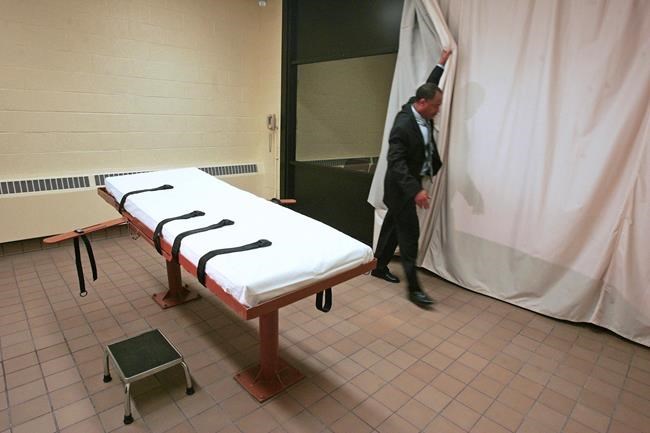
FILE – In this Nov. 2005 file photo, Larry Greene, public information director of the Southern Ohio Correctional Facility, demonstrates how a curtain is pulled between the death chamber and witness room at the prison in Lucasville, Ohio. With Ohio's next execution scheduled for Wednesday, Nov. 15, 2017, the state has sufficiently replenished its lethal drug supply to carry out nearly 20 executions under certain conditions, according to records obtained by The Associated Press. (AP Photo/Kiichiro Sato, File)
October 05, 2017 - 8:53 AM
COLUMBUS, Ohio - Ohio has been able to replenish part of its lethal drug supply in recent months, and could carry out nearly 20 additional executions under certain conditions, according to new records obtained by The Associated Press.
The Department of Rehabilitation and Correction took in new supplies of midazolam, a sedative administered first to condemned inmates, and potassium chloride, which stops prisoners' hearts, in December and January, several weeks after receiving previous supplies of the drugs, the records show.
The records don't indicate whether the department received fresh supplies of the second drug in Ohio's method called rocuronium bromide, which paralyzes inmates.
But even relying on previous supplies, Ohio still has enough drugs for 18 more executions, according to drug logs which the AP obtained exclusively through an open records request.
Over the past decade, execution drug supplies nationally have dried up as manufacturers, under pressure from death penalty opponents, started putting them off limits for capital punishment. The shortage of drugs stopped executions in the state between January 2014 and July.
Getting any information about Ohio's execution drug supply has become increasingly difficult in recent years, thanks to a secrecy law that shields almost all details about the drugs, including their source and their expiration date. Death penalty supporters said the law — similar to laws in other states — was necessary to protect drugmakers from threats of violence if their role in capital punishment was made public.
Through records requests, the AP has twice been able to document the amounts Ohio receives, though not the source of the drugs.
The number of upcoming executions is not guaranteed. Court rulings and clemency decisions could spare some inmates.
Drug supplies also expire, which could also decrease the actual number of executions Ohio could undertake. The secrecy law shields such information, though a recent court filing indicated the drugs hadn't expired as of July 26, when Ohio executed child killer Ronald Phillips.
In addition, if Ohio had to use extra amounts of drugs during an execution — should the first dose of the sedative not work, for example — that could also reduce the amount available for future procedures.
After executing Dennis McGuire in January 2014, Ohio — like many states — looked unsuccessfully for years for a new source of lethal drugs.
The state won't say where it obtains its drugs. Attorneys for Ohio have said in court filings the drugs are from federally regulated manufacturers and are not being compounded in specialty doses, as in some states.
Ohio announced a year ago it had obtained new supplies of drugs. After courts cleared the way to use them, Ohio put Phillips to death in July and executed Gary Otte in September for killing two people in Parma, in suburban Cleveland, in robberies over two days.
JoEllen Smith, an Ohio prisons department spokeswoman, declined comment.
Several drugmakers wrote Ohio prisons director Gary Mohr in July, shortly before the Phillips execution, demanding information about the state's source for its drugs.
"Mylan takes seriously the possibility that one of its products may have been diverted for a use that is inconsistent with its approved labeling," Brian Roman, the company's General Counsel, wrote to Mohr on July 14, requesting a prompt reply. The AP obtained the letter through a records request.
Canonsburg, Pennsylvania-based Mylan makes rocuronium bromide. The state never responded, Mylan spokeswoman Julie Knell said.
Bethlehem, Pennsylvania-based B. Braun Medical Inc.; New York City-based Pfizer; Princeton, New Jersey-based Sandoz Inc.; and Eatontown, New Jersey-based, West-Ward Pharmaceuticals, sent similar letters.
The next execution is scheduled for Nov. 15 for Alva Campbell, sentenced to die for killing 18-year-old Charles Dials during a 1997 carjacking in central Ohio.
Attorneys for Campbell argue midazolam still raises an unconstitutional risk of serious pain because it may not render inmates so deeply unconscious that they don't feel the second two drugs.
___
Andrew Welsh-Huggins can be reached on Twitter at https://twitter.com/awhcolumbus.
News from © The Associated Press, 2017